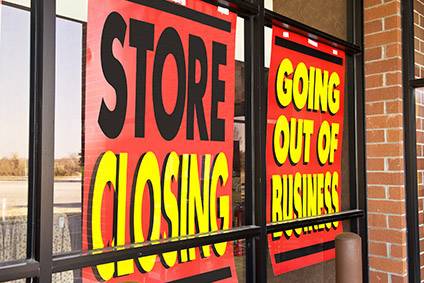
The US retail and apparel sector faces surging defaults over the next 12 months as companies succumb to pressures mounting from the lengthy shutdown and potentially slow recovery from the Covid-19 pandemic, a new forecast suggests.
Citing the “severe dislocation” as the coronavirus outbreak forces mandatory closures of non-essential stores and exacts a mounting toll on world economies, analysts at Moody’s Investors Service project the default rate for speculative grade retail and apparel companies will surge to 17.2% by April 2021 from today’s 12.4%.
This puts it on par with the previous 2018 peak of 17% – and will also surpass the embattled oil and gas industry, which is seen at a 16.5% default rate over the same period.
The credit ratings agency has also lowered its GDP forecasts for the G-20 advanced economies as a group to contract by 5.6% and the US to contract by 5.7% in 2020 respectively.
“Even with a gradual recovery, we expect 2021 real GDP in most advanced economies to be below pre-coronavirus levels,” it adds. “None of the companies in the discretionary retail and apparel sectors – no matter how strong – will emerge unscathed.
“It will be much worse for companies that went into the coronavirus crisis with weak balance sheets, challenged business models and weak liquidity profiles. These will not have the capacity to withstand the pressure or reduce cash burn in any significant way. They will not have much access to capital markets to shore up their liquidity positions.”

US Tariffs are shifting - will you react or anticipate?
Don’t let policy changes catch you off guard. Stay proactive with real-time data and expert analysis.
By GlobalDataMoody’s also expects the number of “distressed names” will only grow in coming months as weaker, smaller, stressed companies succumb to the pressures mounting from the industry’s broad, protracted shutdown and a subsequent slow recovery.
“Coronavirus will result in accelerated Darwinism for retail and apparel sector. The retail and apparel industry will exhibit accelerating separation between the haves and have-nots after the coronavirus related disruption is behind us. We will see the aggressive competitive trends that were permeating the retail landscape prior to the coronavirus intensify once the crisis has passed.
“The larger competitors will double down on efforts to grab more market share and increase their e-commerce penetration. These larger, stronger and more diversified players will emerge emboldened as increasing numbers of the smaller, weaker, highly leveraged competitors fail.”
According to a note issued on Friday (1 May), it believes about 80% of the outstanding distressed (Caa1 and lower) retail and apparel debt is concentrated in nine companies: JCPenney (Caa3 negative), Neiman Marcus (Caa3 stable), Rite Aid Corp (Caa1 stable), Belk (Caa1 negative), Academy (Caa2 negative), Ascena (Caa3 negative), Petco (Caa1 negative), Party City(Caa1 negative), and J.Crew (Caa3 negative).
Yesterday (4 May), US apparel retailer J.Crew Group filed for Chapter 11 bankruptcy protection as part of an agreement that will hand over control to its top lenders. And reports continue to circulate that department store retailer JCPenney Company is in talks with lenders for an emergency loan that would fund its operations during a court-supervised bankruptcy.
“Private equity sponsors own most of the distressed retailers, which means many will try to amend credit agreements in ways that will be detrimental to creditors in order to avoid default. An increasing number of these transactions will be distressed exchanges.
“As a growing number of retailer and apparel companies find performance coming under mounting performance pressure, they will resort to lowering costs and streamlining operations. The shock of having practically no revenue for months will be too much to bear for retail and apparel companies that have weak liquidity, pending debt maturities and weak balance sheets.”
Once the economy opens back up, retailers will be highly promotional as they fight to regain traffic and lower inventory, which will inevitably result in lower margins, the analysts say.
“Government support programmes will provide limited relief, but not enough to save the weakest. We expect that the $2.2 trillion CARES Act unveiled on 27 March and the Federal Reserve’s $600 billion Main Street Lending Program announced on 9 April will help ease performance strains for healthier companies.
“However, the assistance will not be enough for those that already entered the downturn in a weakened state.”




